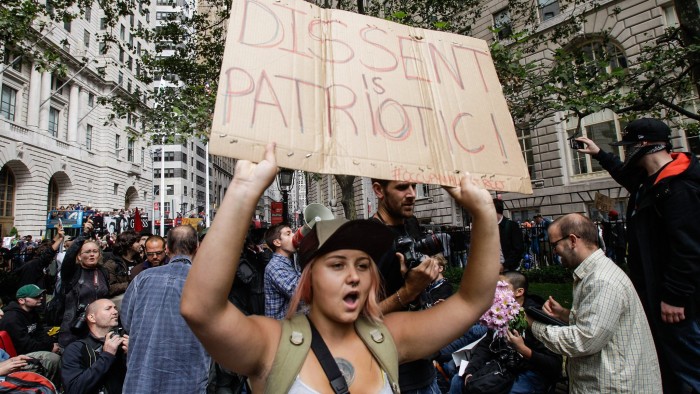Davos: social crisis demands ‘qualitative easing’ — and business must lead

Roula Khalaf, Editor of the FT, selects her favourite stories in this weekly newsletter.
Ten years ago, as the global financial crisis unfolded, we faced the real prospect of systemic collapse that would have meant years of shrinking economies, unemployment and human misery around the world. While the worst economic scenarios were avoided, the damage the crisis inflicted on the relationship between business and society has been lingering and traumatic. The chronic loss of trust in institutions, combined with whirlwind forces of technological change and underlying inequalities has led to a new crisis, this time not only economic, but a deep and unsettling social crisis.
In response to the financial crisis of 2008, quantitative easing helped ailing economies to adjust and recover. Today we need the social equivalent of quantitative easing, a new social contract that provides “qualitative easing” for societies struggling with the realities of a transforming world. Just as governments and financial oversight bodies came together with significant rescue measures a decade ago, so today’s crisis requires stakeholders to engage in a determined effort to rebuild the foundations of society.
Societies around the world are struggling to define how government, business and citizens should respond to the global forces that are undermining their fabric. As technology reshapes everything from how we communicate to the financial payments system to the fundamental nature of what it means to be human, our existing tools of governance have proved inadequate.
Through the postwar decades, countries that saw the strongest and most widely distributed prosperity had a powerful and positive social contract at their heart. The social democratic consensus in the west saw the growth of its economies and business sectors paired with new welfare states; Japan’s lifetime employment fuelled its economic miracle; China’s economic rise has been the result of tempering markets with social structures.
The arrangements that underpinned these successes paired growth with inclusiveness. They implied mutual responsibility for the future between stakeholders, sharing prosperity not only between capital and enterprise, but also labour (the people) and land (the environment). Today there is a widespread perception that the distribution is skewed too much towards capital and enterprise.
The system that served many countries well has been broken. In the view of many it has become an “anti-social contract”, under which business is empowered to take what it can get away with and give the minimum required. For too long, the system has been structured to motivate business leaders to look only at the short term. As with the financial crisis, where the underpinning of the global system was threatened, the foundation of our social relationship is under severe strain. This crisis requires an concerted attempt from all stakeholders to avert disaster.
In a globalised world, national governments can have only so much impact, and most global institutions were built for a different era. Business, on the other hand, has both global span and influence and is a leading participant in the health of the economic system. The healthier the global economy, the more growth economies and businesses see. If the system is broken and failing to deliver on its social obligations, business must play a leading role in repairing it.
So how can business work with other stakeholders to reshape today’s conditions? Business leaders must reframe their decision-making from the short-term reporting cycle to take into account their impact on the environments within which they operate. They must work with government and civil society leaders to reshape their operating environments to enable them to do so.
Every day, business leaders are faced with a host of decisions: how best to respond to market threats, how to structure tax reporting, how to work with the gig economy, whether and how to automate, whether to use low interest rates to invest or to buy back shares, how to combine local employment and community contributions with global business imperatives, how to close the gender gap. It is not what leaders say, but the decisions that they take that make up our society’s fabric.
Business leaders are called upon to play the role of reformers, of both their organisations and the economic and social systems in which they operate. The best will do the latter by focusing on the former. Many corporate controls and decision-making mechanisms are set up for environments of scarce, expensive capital and abundant talent. Today, global business has abundant, cheap capital and scarce talent. Investing in people — education, training, leadership, gender balance — is a priority for all business. If it does it well, it will have done a great deal to rebuild the social contract.
Business must take the lead but it cannot do so alone. To enable true qualitative easing and repair of the system, government and civil society must be brought along. Leaders from all parts of society that work together to build the welfare and prosperity of their citizens — their health, education, security and opportunity — will be doing what they can to future-proof communities from the powerful forces of change that are the signature of our times.
The writer is executive chairman of the World Economic Forum
Comments